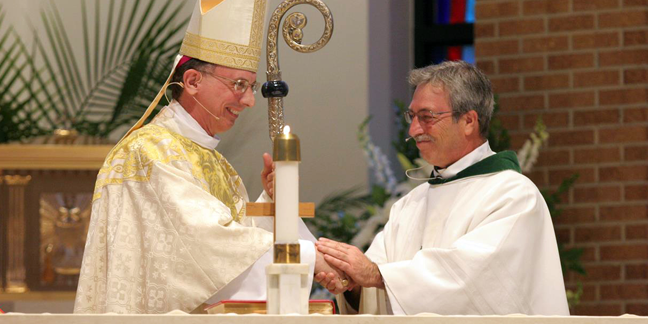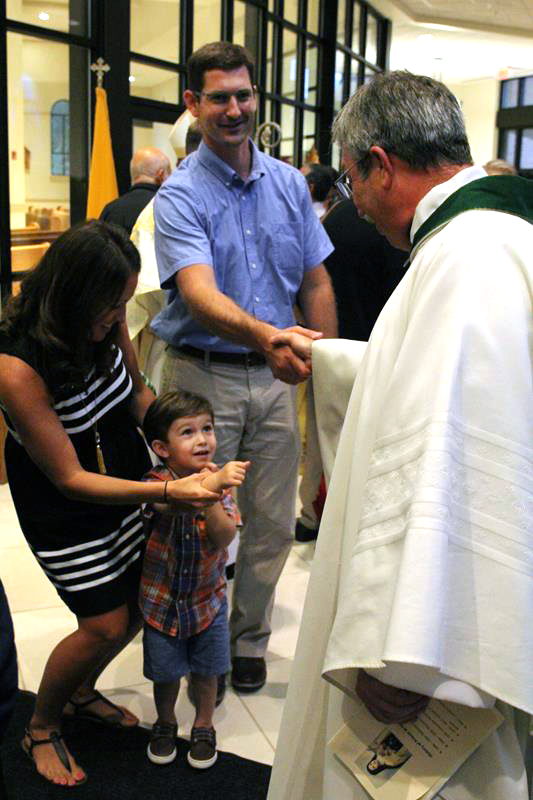 MOORESVILLE — Father Mark Lawlor was officially installed Aug. 31 as pastor of St. Thérèse Church, the third largest parish in the Diocese of Charlotte.
MOORESVILLE — Father Mark Lawlor was officially installed Aug. 31 as pastor of St. Thérèse Church, the third largest parish in the Diocese of Charlotte.
Father Lawlor comes to the Mooresville parish from St. Vincent de Paul Church in Charlotte, where he was pastor for the past 14 years. He is the first diocesan priest in 47 years, following the relocation of the Jesuits of the Province of Maryland who had served the parish since 1970.
During the installation rite at the start of the Mass, Deacon Joe Santen read aloud Father Lawlor’s official letter of appointment. Bishop Peter Jugis and the congregation then witnessed Father Lawlor make his profession of faith, renew his oath of fidelity to the Church, and sign the official Church documents of his new office.
During his homily, Bishop Jugis welcomed everyone who attended the installation Mass. The parish’s new parochial vicars Father Paul McNulty and Father Henry Tutuwan were present, as well as Father John Eckert, pastor of Sacred Heart Church in Salisbury, and Father Lucas Rossi, his parochial vicar. Deacon Myles Decker of St. Thérèse Parish also assisted at the Mass.
“When a pastor arrives at his parish for the first time, there are a multiplicity of demands that are suddenly thrust upon him, a lot to do and a lot to learn immediately as he begins his ministry,” Bishop Jugis said.
St. Thérèse Parish, which has more than 4,000 families, is more than twice the size of Father Lawlor’s former parish, he noted. “You can imagine the multiplicity of demands that are placed upon his shoulders that he has to address.”
But above all this day-to-day work, a pastor must remain focused on three essential duties, Bishop Jugis emphasized: he must teach, sanctify and lead his parishioners.
A pastor has the responsibility to teach the faith, the bishop said, so making the profession of faith at his installation – in front of the bishop and the entire congregation – is important. “He is telling the faithful he will accept the faith, embrace the faith, profess the faith in their midst and lead them in the profession and practice of that faith.”
A pastor renews his oath of fidelity to the Church, the bishop also explained, to demonstrate publicly that he will be faithful to what the Gospel demands, faithful to what the Church teaches, and faithful to the practices and the discipline of the Church.
“These are very significant statements for someone who is placed in such an important position – the care of souls, the salvation of souls, the most important job on the face of the earth, salvation,” Bishop Jugis said. At his installation Mass, the pastor – not the deacon – proclaims the Gospel, the bishop noted. “That signifies that the pastor is ultimately in charge for passing on the teaching of the Gospel, the teaching of Christ and the teaching of the faith in his parish.”
At his installation Mass, the pastor – not the deacon – proclaims the Gospel, the bishop noted. “That signifies that the pastor is ultimately in charge for passing on the teaching of the Gospel, the teaching of Christ and the teaching of the faith in his parish.”
Besides his teaching role, the pastor must also offer the sacraments of the Church to the faithful, Bishop Jugis said.
“It’s appropriate that an installation of the pastor takes place at the Mass, because the Mass is the most important work of the priest. It’s the most important work of the parish. It’s the most important work of the Church. It’s the offering of the Sacrifice of Jesus for the salvation of the world to give honor and praise and glory to Almighty God in heaven.
“All of the ministries of the Church really take their power, their force and their strength from the altar, from Jesus, His Real Presence here.”
At Mass we are transformed by receiving Christ in the Eucharist, he said. We become more Christ-like; we grow in faith, hope and charity; and we are called to share that faith, hope and love in everything we do outside of church.
“You might look at the altar, or the Eucharist, Jesus’ Real Presence, as the bright sun shining in the universe of the parish,” he suggested. “There are rays emanating out from that Eucharist, from that sun, into all of the ministries of the parish, giving light and the warmth of Christ’s love to all of those ministries.”
Lastly, a pastor is responsible for governing the parish, the bishop said. Beyond making sure that everything is organized and that the buildings are cared for, it means he is also charged with getting to know the parish’s families.
In conclusion Bishop Jugis joked, “Do you think that is enough?”, eliciting laughter from the congregation.
“I think it is. But you know, he doesn’t do it all by himself – because you are here. He depends upon all of you to lend your support and to assist in the vitality of the whole parish life, that it keeps moving forward and shining as a bright light of Christ here in this section of our diocese.”
At the end of Mass, Father Lawlor recalled advice he received from a professor in the seminary: when a new pastor arrives, he should learn the parish’s history.
“I have always followed that in my previous assignments,” he said, and over the past seven weeks he has been doing the same thing in Mooresville. He read the parish’s history, listened to longtime parish employees, and made a pilgrimage with both parochial vicars to the old church building on Main Street.
“I know, in my brief time here, of the great dedication and talent and perseverance we can see in the work of the Church here,” he said. “I thank Bishop Jugis for the confidence he had in appointing me here.”
He quipped, “I would have been happy to have gone to a small parish in the mountains...,” then he continued earnestly, “I, without hesitation, accepted the assignment that was presented to me.
“I have learned in my 22 years as a priest that in every assignment there are unexpected graces, really bountiful graces, and I can see that is the case here in Mooresville.”
— SueAnn Howell, senior reporter


